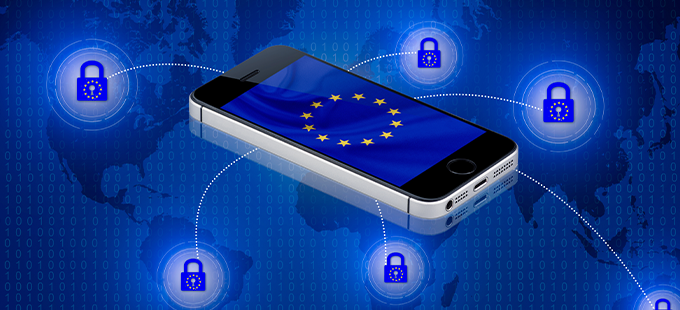If you think about it, it’s not a far stretch to compare data to oil. Data is the new oil; it’s lucrative and essential in every industry today. But just like oil, if it leaks, the cleanup is costly and sometimes catastrophic. As a Kansas City business owner, especially if you operate online or collaborate internationally, the European Union’s General Data Protection Regulation (GDPR) isn’t just a distant legal quirk. It’s a global standard that could impact your bottom line.
Our IT experts are here to help you understand what GDPR means for Kansas City businesses, how it differs from domestic privacy laws and how to update your data policies to stay globally compliant. Whether you have an internal IT professional or outsource your IT department for peace of mind, understanding these regulations is crucial to protecting your business, your customers and your reputation.
How GDPR Affects Kansas City Companies Handling International Data
Think GDPR doesn’t apply to your company or branch in Kansas City? Au contraire. If you collect or process personal data from individuals in the EU — whether through an e-commerce platform, marketing campaign or service offering — you’re subject to GDPR’s rules.
GDPR’s key requirements include:
- Explicit consent for data use
- Right to be forgotten (data erasure)
- Prompt breach notification (within 72 hours)
The GDPR’s global reach makes it relevant even if your business isn’t physically located in Europe. It governs any company, anywhere, that interacts with personal data coming from anywhere in the EU.
Why comply with GDPR?
- Avoid fines of up to 4% of global revenue
- Improve internal data practices
- Build trust with international clients
Bottom line: GDPR isn’t just European law, it’s setting the pace for data governance around the world. That means your business needs to follow suit.
What’s the difference Between GDPR and U.S. Privacy Laws?
U.S. privacy laws tend to be reactive and fragmented, with state-by-state frameworks like the California Consumer Privacy Act (CCPA) or industry-specific laws like HIPAA. GDPR, by contrast, is comprehensive, proactive and unified, which is why it’s setting the universal standard.
Key differences:
- GDPR gives more power to individuals: Think data access, correction, portability and deletion.
- Enforcement is stronger: With centralized regulators and steeper penalties.
- Scope is broader: GDPR protects any personal data, regardless of context.
How to Make Your Data Policies Globally Compliant
One question our IT experts are answering a lot is: how do I align my existing policies with GDPR and other international regulations? Start by building the foundation with these proven strategies:
- Conduct a Data Mapping Audit
Understand what data you collect, where it lives and who can access it. This builds visibility and reduces blind spots. - Update Your Privacy Notices
Clear, concise and transparent communication builds trust and avoids regulatory pitfalls. - Implement Consent Management Tools
Opt-in should be standard. Make sure users can easily withdraw consent at any time. - Designate a Data Protection Officer (DPO)
For businesses heavily engaged in data processing, a DPO ensures oversight and accountability. - Use Technology to Automate Compliance
Encryption, data loss prevention (DLP), and audit trails are must-haves. Your managed IT services provider should be leading this charge.
Compliance Snapshot: When Things Go Sideways
In August 2024, Uber, the San Francisco–based ride-hailing giant, was hit with a €290 million fine by the Dutch Data Protection Authority. The violation? Transferring European drivers’ personal data, including sensitive location, identity and payment information to servers in the U.S. without sufficient safeguards.
This wasn’t just about big tech. It’s a clear lesson for U.S.-based businesses handling international data. A proactive data audit, upgraded consent practices and better consent management tools — exactly what a strong IT partner like Invision delivers — could help your business avoid steep penalties.
What This Means for Kansas City SMBs and Outsourced IT Providers
Small and mid-sized businesses (SMBs) are often the most vulnerable. They lack the in-house expertise or bandwidth to track evolving regulations. That’s where a reliable Kansas City IT support partner like Invision comes in.
As a trusted provider of managed IT services, the Invision team helps Kansas City businesses:
- Assess data flows and risks
- Implement compliance technologies
- Maintain documentation and logs
- Support ongoing audits and updates
Becoming and remaining compliant with GDPR is just one aspect of a broader shift in how companies approach data protection. As threats evolve, so must your cybersecurity strategies. Layered, proactive defenses are no longer optional.
Outsourcing your IT doesn’t mean giving up control. It means gaining a team of computer consulting experts who monitor compliance (GDPR and otherwise) while you focus on growth.
With the right outsourced IT support, your business gains access to cybersecurity expertise, scalable tools and the regulatory insight needed to stay compliant.
Let’s turn compliance into your competitive edge. Contact Invision today to schedule a consultation and ensure your data policies are globally compliant.




